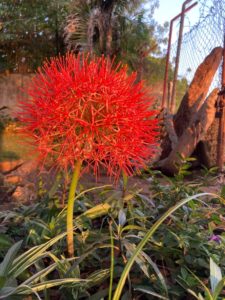CREATE SPACE FOR NATURE
Whether you manage a boutique hotel on the coral coast, support your family with shamba-grown fresh food, or are squeezing some ornamental pots onto your balcony, you can create space for nature in your landscaping.
Zanzibar’s space-for-nature movement
Zanzibar’s Space for Nature campaign was the inspiration of Social Ecologist Robert Wild, Hon. Fellow. University of York, with whom we are delighted to collaborate to promote space for nature throughout the archipelago.
The movement became mainstream when Creating Space for Nature was selected as one of the commitments of the Zanzibar Declaration on Sustainable Tourism.
In support of this mission we are developing this growing set of tools.
Grow local plants in place of exotic species
Coming soon:
Garden ecologically
These tools will help those who chose to Create Space for Nature as part of their commitment to the Zanzibar Declaration on Sustainable Tourism!
Grow local plants in place of exotics
We are curating lists of species for different places and purposes, using iNaturalist’s comprehensive database and project tools.
So you can find pictures of the plants you want, show them to your gardener or the plant nursery, identify species growing near you, and log your records online.
Please get in touch if you would like to join the team curating the lists! To view them, click on the links below.

Grow native species
Growing native plants is the simplest and most effective way to support Zanzibar Wildlife, join the #GreenerZanzibar initiative and create space for nature.
Indigenous plants for container gardens
Native plants for pollinators
Bio-cooling plants for shade
Iconic indigenous trees
Coming soon:
Coral Rag Restoration species
Eradicate invasive species
For millennia, people have brought plants and animals to Zanzibar from all over the world – many now established as important long-standing staples of diet, culture and landscape.
Yet, a few of these introduced species have had a less benign impact on the ecological landscape, and have made themselves a little too much at home. They don’t just breed well in wild spaces, they actively displace existing wild species, spread disease, or even take over completely, to become pests of field and forest.
They prevent other things growing in various ways such as producing natural herbicides in their leaves and fruits which are unpalatable to grazing animals or make the soil inhospitable to new seedlings, or they simply grow faster than the native competition, blocking light.
The invasive House Crow deserves a chapter of its own for the impact it has had on wild bird species (and domestically stealing animal food and eating baby chickens), and impacting whole forest ecosystems spreading seeds of invasive plants in its droppings.
These are not friends to our wildlife gardens, and are best removed. We have compiled a list of the worst offenders that we recommend removing as thoroughly as you can. Lest they become the only life left.
Invasive alien species to eradicate
Cultivate cultural heritage
Zanzibar’s rich cultural heritage is entrenched in the landscape and plants and animals are of central importance for food, architecture, livelihood, medicine, religion and ritual.
Our gardens are a place to cherish and celebrate the diversity of especially the wild varieties of plant traditionally used – to safeguard the ancient knowledge and indigenous cultural wisdom along with the varieties of plant intrinsic to the cultural practices.
Traditional greens
Traditional fruits
Traditional medicinal plants
Coming soon:
Aromatic plants for a scented garden
Sacred plants
Manage introduced exotic species
Some exotic species introduced to Zanzibar do not actively harm wildlife, yet effectively have taken the place of native species in our gardens: a purpose that could equally be served by indigenous alternatives.
Some have value under controlled cultivation, yet cause problems when they grow in wild ecosystems. Mature trees give precious shade, some exotic flowers may still feed bees, and fruiting plants feed birds and mammals.
Plants on these lists should not usually be planted or propagated newly: native alternatives are available. But they should definitely be removed from wild ecosystems and excluded from re-wilding projects.
Exotic species to replace
Garden Ecologically
Coming Soon!
